|
|
|
Sort Order |
|
|
|
Items / Page
|
|
|
|
|
|
|
| Srl | Item |
| 1 |
ID:
158864
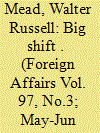

|
|
|
|
|
| Summary/Abstract |
As Americans struggle to make sense of a series of uncomfortable economic changes and disturbing [1]political developments [1], a worrying picture emerges: of ineffective politicians, frequent scandals, racial backsliding, polarized and irresponsible news media, populists spouting quack economic remedies, growing suspicion of elites and experts, frightening outbreaks of violence, major job losses, high-profile terrorist attacks, anti-immigrant agitation, declining social mobility, giant corporations dominating the economy, rising inequality, and the appearance of a new class of super-empowered billionaires in finance and technology-heavy industries.
|
|
|
|
|
|
|
|
|
|
|
|
|
|
|
|
| 2 |
ID:
028679
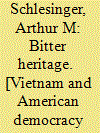

|
|
|
|
|
| Publication |
London, Andre Deutsch, 1967.
|
| Description |
127p.hbk
|
|
|
|
|
|
|
|
|
|
|
|
Copies: C:1/I:0,R:0,Q:0
Circulation
| Accession# | Call# | Current Location | Status | Policy | Location |
| 000170 | 959.7043/SCH 000170 | Main | On Shelf | General | |
|
|
|
|
| 3 |
ID:
116104
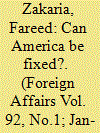

|
|
|
|
|
| Publication |
2013.
|
| Summary/Abstract |
In November, the American electorate, deeply unhappy with Washington and its political gridlock, voted to maintain precisely the same distribution of power -- returning President Barack Obama for a second term and restoring a Democratic Senate and a Republican House of Representatives. With at least the electoral uncertainty out of the way, attention quickly turned to how the country's lawmakers would address the immediate crisis known as the fiscal cliff -- the impending end-of-year tax increases and government spending cuts mandated by earlier legislation.
|
|
|
|
|
|
|
|
|
|
|
|
|
|
|
|
| 4 |
ID:
110460
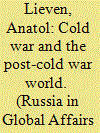

|
|
|
|
|
| Publication |
2011.
|
| Summary/Abstract |
Rather than a future in which Chinese hegemony will replace that of the United States, we seem to be rapidly entering a world in which no country will exercise anything resembling true world leadership. This bears a sinister resemblance to the 1920s, when the United States replaced Britain as the world's leading economic power, but was wholly unwilling to shoulder additional burdens of global leadership.
|
|
|
|
|
|
|
|
|
|
|
|
|
|
|
|
| 5 |
ID:
097914
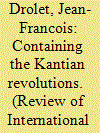

|
|
|
|
|
| Publication |
2010.
|
| Summary/Abstract |
This article examines the neo-conservative critique of global liberal governance. It provides a theoretically oriented assessment of the neo-conservative case against international law and human rights regimes, and draws out the main political and ethical implications for American democracy and American foreign policy. It is argued that the neo-conservative critique of global governance rests upon an interpretation of the normative order that weaves together democracy, individual rights and national autonomy through a volatile identity politics which is fundamentally at odds with both the pluralist character of 'Westphalian diplomacy' and the universal order of rights envisaged by advocates of global governance. More than just the policy autonomy of the US, what is really at stakes in those debates for neo-conservatives is the whole structure of cultural and socio-economic interests that is tied to the substantive interpretation of democracy upon which their domestic commitments to neo-liberal capitalism and liberal freedoms are predicated.
|
|
|
|
|
|
|
|
|
|
|
|
|
|
|
|
| 6 |
ID:
142692
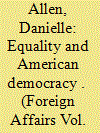

|
|
|
|
|
| Summary/Abstract |
Since the trend toward rising economic inequality [1] in the United States became apparent in the 1990s, scholars and commentators have heatedly debated its causes and consequences. What has been less evident is a vigorous positive discussion about what equality means and how it might be pursued.
|
|
|
|
|
|
|
|
|
|
|
|
|
|
|
|
| 7 |
ID:
127181
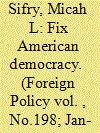

|
|
|
| 8 |
ID:
174672
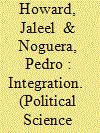

|
|
|
|
|
| Summary/Abstract |
JALEEL HOWARD and PEDRO NOGUERA review the recently published Children on the Dram: Why School Integration Works and A Single Garment: Creating Intentionally Diverse Schools That Benefit All Children. They find that through in-depth analysis the books provide substantial evidence supporting the landmark Brown v. Board of Education decision and the need for diverse schools. They argue that integration is not only a valuable tool in child development, but also essential for the future of American democracy.
|
|
|
|
|
|
|
|
|
|
|
|
|
|
|
|
| 9 |
ID:
078291
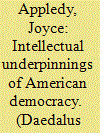

|
|
|
| 10 |
ID:
116474
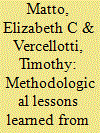

|
|
|
|
|
| Publication |
2012.
|
| Summary/Abstract |
With the growing size of the "Millennial Generation" and its potential impact on American democracy, the civic education of this cohort deserves study. Using news media and discussion of politics at home and in the classroom at four public high schools in New Jersey, we conducted an experiment to measure changes in media use, political knowledge, and political efficacy. Although the experiment generated useful substantive findings, we also learned important lessons about the challenges associated with conducting research in high schools. We present suggestions to aid in studying a crucial segment of the population: adolescents who are on the cusp of entering the electorate.
|
|
|
|
|
|
|
|
|
|
|
|
|
|
|
|
| 11 |
ID:
179611
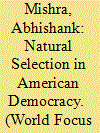

|
|
|
|
|
| Summary/Abstract |
After four tumultuous years of Donald Trump being at the helm of the American Presidency, the American people chose change in the form of Joseph Robinette Biden Jr. or Joe Biden in 2020. The cracks in the Trump Presidency were apparent from the beginning with a record-breaking 34 percent turnover rate in the first year1 but the rampant spread and unprecedented casualties as a consequence of the mishandling of the COVID-19 pandemic exposed the inadequacies of the Trump Presidency.
|
|
|
|
|
|
|
|
|
|
|
|
|
|
|
|
| 12 |
ID:
121052
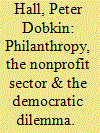

|
|
|
|
|
| Publication |
2013.
|
| Summary/Abstract |
The central dilemma of American democracy is the tension between "voice" and "equality": between the Constitution's unconditional guarantees of citizens' expressive, associational, and property rights and the legal and political equality that is the foundation of majoritarian decision-making. Philanthropy and nonprofit organizations - which enable citizens to give money and time to support causes in which they believe - have posed this dilemma with unusual force, allowing moneyed minorities to oppose and sometimes overwhelm the popular will. In the past, these assertions of private power have inevitably aroused popular opposition producing legislative and regulatory outcomes that have maintained a balance between voice and equality. Today, with unprecedented accumulations of wealth and legal changes permitting the unrestricted use of wealth in politics, the unchallenged exercise of private power through philanthropy and the nonprofit sector poses grave threats to the democratic process.
|
|
|
|
|
|
|
|
|
|
|
|
|
|
|
|
| 13 |
ID:
096397
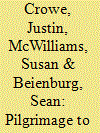

|
|
|
|
|
| Publication |
2010.
|
| Summary/Abstract |
As part of a course considering "American Democracy in Theory and Practice," we took 36 students to Rick Warren's Saddleback Church in Lake Forest, California. During that visit, students observed a community that seeks self-sufficiency and yet proves to be simultaneously responsive to and reflective of American democracy more broadly. Specifically, in a few short hours, they were able to see the virtues of civic association, the difficulty of respecting individualism in large-scale polities, the influence of regional identity, and the two-way interaction between politics and culture-all themes that featured prominently in our course. We offer this reflection to suggest the pedagogical benefits of showing the tensions of American politics in action and to encourage colleagues to consider integrating similar ventures into their own courses.
|
|
|
|
|
|
|
|
|
|
|
|
|
|
|
|
| 14 |
ID:
172882
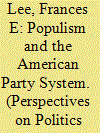

|
|
|
|
|
| Summary/Abstract |
Does populism threaten American democracy, and if so, what is the nature of that threat? In dialogue with the comparative literature on populism, this article considers the opportunity structure available to populist parties and candidates in the American political system. I argue that compared to most other democracies, the US system offers much less opportunity for organized populist parties but more opportunity for populist candidacies. Today’s major parties may also be more vulnerable to populist insurgency than at other points in US history because of (1) changes in communications technology, (2) the unpopularity of mainstream parties and party leaders, and (3) representation gaps created by an increasingly racialized party system. Although no democratic system is immune to deterioration, the US constitutional system impedes authoritarian populism, just as it obstructs party power generally. But the vulnerability of the major parties to populist insurgency poses a threat to liberal democratic norms in the United States, just as it does elsewhere.
|
|
|
|
|
|
|
|
|
|
|
|
|
|
|
|
| 15 |
ID:
179534
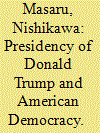

|
|
|
|
|
| Summary/Abstract |
In this article, the following three subjects are identified: (1) as the quantitative evidence shows in the first section of this article, democracy in the US has deteriorated since 2016; (2) there could be multiple possible causes for the deterioration of American democracy. In particular, conjunctural opportunities give populist leaders an opening to project authoritarian schemes in the US against the backdrop of political sectarianism and the rise of negative partisanship; (3) the presidency of Donald Trump could be regarded as a cause of degradation of American democracy. Many of Trump’s traits and actions as president of the United States were damaging to American democracy. However, because Trumpism has not thoroughly permeated the Republican party, a barrier exists against further deterioration or even a transition to authoritarianism.
|
|
|
|
|
|
|
|
|
|
|
|
|
|
|
|
| 16 |
ID:
105366
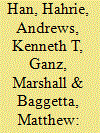

|
|
|
|
|
| Publication |
2011.
|
| Summary/Abstract |
Member-based civic associations, or citizen groups, have two crucial roles in American democracy. They advocate for members' interests in the public arena, but also operate as Tocquevillian "schools of democracy" linking citizens to politics and equipping them with the skills of democratic citizenship. Yet scant research has examined the interrelationships of these two roles. Does the work that civic associations do in developing democratic participants enhance the work they do advocating for members' interests in the public arena? We bring together two previously disparate strands of research on civic associations by arguing that a key factor affecting the political presence of civic associations is leadership quality. We focus on the relationship of leadership quality to political presence, using data from a unique 2003 study of 226 local entities of the Sierra Club. We show that organizations with more skilled and committed leaders have higher levels of political presence. This contrasts with previous research that has focused primarily on community context and resources as explanatory factors. This study shows that political presence is related to the extent to which leaders develop their skills and demonstrate commitment to the organization.
|
|
|
|
|
|
|
|
|
|
|
|
|
|
|
|
| 17 |
ID:
170991
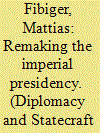

|
|
|
|
|
| Summary/Abstract |
The 1975 Mayaguez incident was a missed opportunity to establish a more democratic American foreign policy. President Gerald Ford managed the crisis seeking domestic and international credibility. But his conception of credibility was more fractured than that of his predecessors, who regarded it as synonymous with militarism, presidential primacy, and secrecy. Ford believed the preservation of American power depended upon a renewal of American democracy, and he was determined to preside over a period of national reconciliation after the traumas of Watergate and Vietnam. His sense of credibility therefore pushed him towards diplomacy in addition to militarism, co-operation with Congress in addition to presidential unilateralism, and openness in addition to secrecy. The antinomies within Ford’s sense of credibility were partly a product of his time, which saw an eruption of public scepticism towards American and presidential power, and partly of his temperament and experience endowing him with a reverence for democratic consensus. Throughout the crisis, Ford wrestled with the contradictions embedded within his sense of credibility. Although he ultimately resolved those contradictions in an anti-democratic direction and deepened the imperial presidency, that outcome was not foreordained.
|
|
|
|
|
|
|
|
|
|
|
|
|
|
|
|
| 18 |
ID:
138850
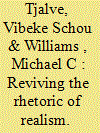

|
|
|
|
|
| Summary/Abstract |
In both disciplinary history and contemporary methodology, realism is conventionally cast as the antithesis of rhetoric. Born in reaction against the empty liberal rhetoric of interwar liberalism and espousing a robust materialism and rigorous rationalism, realism often seems the obstacle that rhetoric’s focus on language, narrative, and social construction must inevitably confront and the challenge around which debates must again inevitably revolve. This article challenges this vision of the relationship between rhetoric and realism. Returning to the birth of international relations in the immediate post-war era, we demonstrate that early realists perceived rhetoric as central to action in domestic as well as international politics and that it was particularly important in the United States. This realist rhetoric is marked by an engagement with grand politics, with the relationship between rhetoric, political identity, social mobilization, political leadership, and foreign policy. Rather than taking either the American state or its national interest for granted, post-war realists sought to counter the dangers of the dominant historical rhetorics of American foreign policy and to develop an alternative rhetoric that could insulate American democracy from destructive tensions and provide the basis for robust and responsible action in world affairs. Recovering the relationship between realism and rhetoric is important not only in challenging disciplinary and methodological orthodoxies that obstruct creative theorizing, but also for its incisive contributions to thinking about American foreign policy amidst the profound changes and challenges it confronts today.
|
|
|
|
|
|
|
|
|
|
|
|
|
|
|
|
| 19 |
ID:
165864
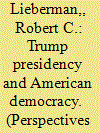

|
|
|
|
|
| Summary/Abstract |
To many observers across the political spectrum, American democracy appears under threat. What does the Trump presidency portend for American politics? How much confidence should we have in the capacity of American institutions to withstand this threat? We argue that understanding what is uniquely threatening to democracy requires looking beyond the particulars of Trump and his presidency. Instead, it demands a historical and comparative perspective on American politics. Drawing on insights from the fields of comparative politics and American political development, we argue that Trump’s election represents the intersection of three streams in American politics: polarized two-party presidentialism; a polity fundamentally divided over membership and status in the political community, in ways structured by race and economic inequality; and the erosion of democratic norms. The current political circumstance threatens the American democratic order because of the interactive effects of institutions, identity, and norm-breaking.
|
|
|
|
|
|
|
|
|
|
|
|
|
|
|
|
| 20 |
ID:
090829
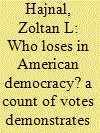

|
|
|
|
|
| Publication |
2009.
|
| Summary/Abstract |
Critics have long feared that America's winner-take-all electoral system would undermine the interests of minorities. Unfortunately, few available tests broadly assess how well minorities fare in a democracy. To gauge winners and losers in the American case, I introduce a new measure of representation. For any election, I count up how many voters from each demographic group vote for a candidate that loses. After comparing this new measure to its alternatives, I use data from the entire series of Voter News Service exit polls and a sample of mayoral elections to determine which kinds of voters end up losers. I find that across the range of American elections, African Americans are consistently more likely than other groups to end up losers, raising questions about equity in American democracy. The one exception to the pattern of black failure-congressional House elections-suggests ways to better incorporate minority interests.
|
|
|
|
|
|
|
|
|
|
|
|
|
|
|
|
|
|
|
|
|